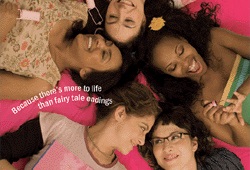
The World Wide Web has often been compared to the great equalizer, an alternative to the fact that the majority of media outlets in the United States are controlled by a small handful of conglomerates. Voices and viewpoints seldom heard in the past have now been given a soapbox of their own, while musically-talented bands who might never have been signed to a major label can find fan-supported success as well.
Although this “equalization” has likewise resulted in a lot of mediocre noise, the intelligent and talented have still managed to rise above the clutter and get their opinions and creations across to the masses nonetheless.
The same promise holds true for the web series medium. Television creation is an arduous process filled with network interference and creative compromises. Most of all, television is a business which traditionally has attracted the “safe” and “popular” instead of taking risks on less mainstream projects. While the television medium has had its share of quality shows and remains the premier storytelling device of our times, many non-traditional narratives have no doubt been left on the wayside.
Yet again, however, where corporate media fails the Internet has stepped in. A prime example is The Real Girl’s Guide to Everything Else, a comedic web series focusing on a feminist lesbian journalist and her attempt to write a book about Afghanistani women.
When her agent nixes the idea and threatens to terminate their professional relationship, Rasha (Robin Dalea) is convinced by her friends Vanna (Nikki Brown), Sydney (Reene Dutt) and Angie (Carmen Elena Mitchell) to write a chick-lit novel – “those books with the pink covers and the bubbly-font chapter headings where the main character’s always looking for Mister Right and maxing out her credit cards along the way” – as a means to raise the necessary funds to travel to Afghanistan.
While her friends are straight and fashionably progressive, however, Rasha has never been with a man and prefers combat boots to Jimmy Choos. Her friends thus decide to educate her on the “traditional” female lifestyle as a form of research, hooking her up with a pair of booty shorts and a True-Love-Always-Forever-dot-com dating profile.
In many ways The Real Girl’s Guide to Everything Else resembles an anti-Sex and the City, an intentional comparison made obvious at the start of each episode as the web series mimics the HBO show’s iconic opening credits sequence. The four main characters also share their thoughts over lunch and a large amount of the dialogue centers on humorous-but-frank sexual discussions.
Rasha, for instance, explains to her male pseudo-date that not all women wax their private parts. “You know that women’s pubic hair doesn’t grow in neat, skinny, little rectangular landing strips naturally, right?” she asks when he seems confused.
This is not to suggest that the web series is a parody or Sex and the City wannabe – The Real Girl’s Guide to Everything Else is quality entertainment in its own right and any references to its HBO counterpart only adds to the enjoyment. The first three episodes are the most entertaining of the series as Rasha navigates her way through high heels and superficial guys, all the while attempting to keep her life-partner Liz (Jennifer Weaver) reassured that she is not changing into someone else just weeks before their wedding. Their pillow-talk conversation about Rasha’s recently-waxed vagina coupled with Liz’s Naomi Wolf-style feminist ranting, for instance, is a classic.
The second half of the six-episode first season maintains the humor and insightful observations but seems a little rushed from a narrative standpoint. Still, the web series concludes in a fulfilling manner and a sense of resolution that also leaves the door open for more installments.
“The idea came out of my growing frustration with a lot of mainstream television shows and films marketed towards women,” creator Carmen Elena Mitchell explained to Cherry Grrl in March 2010. “I felt like I wasn’t seeing myself in these movies. I wasn’t seeing my friends. I wasn’t hearing our conversations. Why was everything about chasing unavailable men and pining over expensive footwear? Where were the conversations about politics, books, art, and our careers? And while I’m not anti-fashion, anti-relationship, or anti-girly-girl, I feel like there’s so much more to explore in women’s lives.”
With only a handful of companies owning the vast majority of television networks and cable channels in the country – as well as the difficulty of breaking into the industry and finding success – it is doubtful that Carmen Elena Mitchell would have had the opportunity to tell her version of life and friendship through mainstream media.
By combining quality writing and acting, along with top-notch directing by Heather de Michele, Mitchell instead created a solid and funny web series that not only adds to the entertainment value of the budding new genre, but proves that the Internet can be the defining equalizer for television just as it has been for other mediums.
Anthony Letizia

